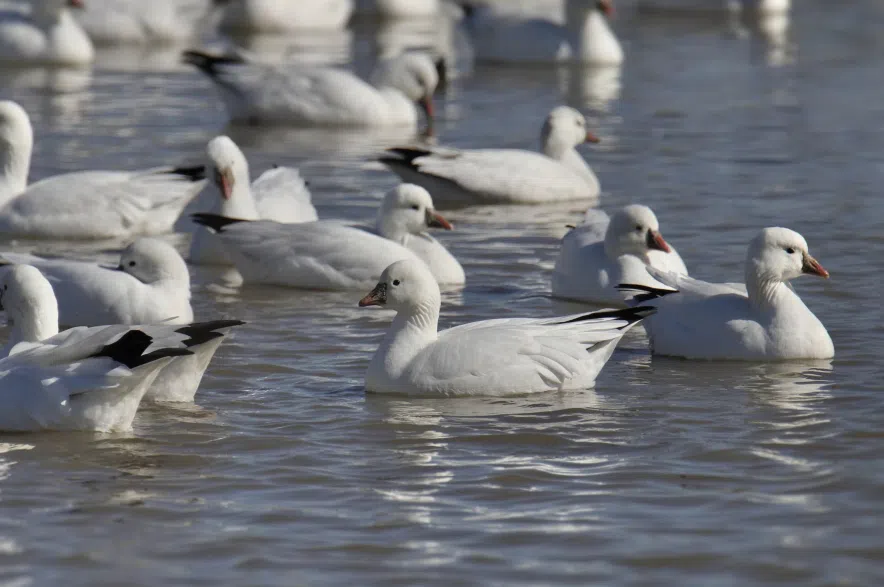Saskatoon’s Living Sky Wildlife Rehabilitiation and Regina’s Salthaven West Wildlife Rehabilitation centres are warning the public about handling sick or dead wild birds and mammals as cases of bird flu are on the rise.
Both organizations say they are receiving multiple calls every day about suspected Highly Pathogenic Avian Influenza HPAI (H5N1) in snow geese and Canada geese returning to the province.
Read more:
- With 8.7m birds dead, B.C. farmers assess avian flu toll, and worry about what’s next
- Avian flu causing egg prices to rise in North America
Jan Shadick, executive director of Living Sky Wildlife Rehabilitation, said it seems that more snow geese are exhibiting symptoms this year.
“We are definitely getting calls about these birds and it’s not just the geese, because what happens is the virus lives in water quite successfully and so when these birds are migrating through … if there’s one bird on the water, then all the other birds on the water are susceptible,” Shadick explained.
She said it’s not just birds but also predators that are becoming infected with the deadly virus.
“The foxes and the raccoons and the skunks and the coyotes and all of the bird predators — your bald eagles, your hawks, your owls — are eating these carcasses and becoming sick themselves,” Shadick said.
The HPAI strain was first seen in North America in late 2021 and early 2022. It has been “traumatizing” for bird populations according to Shadick, who said every spring and fall since then seem to be the worst times for birds and nearby mammal populations.
“They (birds) get sick very quickly and they show show signs of the sickness very quickly and they’re usually dead within three days at the most.”
Signs of illness include birds being lethargic, unable to fly, unable to balance well, experiencing tremors and seizures and they may have a discharge from their mouth and nose.
Shadick says if people come across animals with those symptoms, they shouldn’t touch them or get near them without proper personal protective equipment (PPE), like masks and gloves at the very least.
Salthaven West said in a statement, “Though transmission to humans is rare, HPAI is a zoonotic disease (can be transmitted to humans). If you have handled a sick or dead animal thought to have HPAI, wash and sanitize your hands and any surface it came into contact with. If you become ill, contact the provincial health line at 811 for information or advice.”
Shadick echoes that advice and adds that people should also remove their shoes and clothing before entering their homes if they have handled a possibly infected bird or animal, especially if they have pet birds.
If people do bring in sick animals to the Saskatoon facility in Sutherland, there is a specialized quarantine area where they can be held.
“We have built the capacity to deal with these animals and keep all of the other animals at our facility safe,” Shadick explained.
Salthaven West however, does not admit or transport animals showing clinical signs of HPAI because of the risk of transmission to other animals in their care and the potential exposure risk to staff and volunteers.
Anyone who comes across a bird or mammal showing signs of HPAI should also contact the Ministry of Environment inquiry line at 1-800-567-4224.
Read more:











